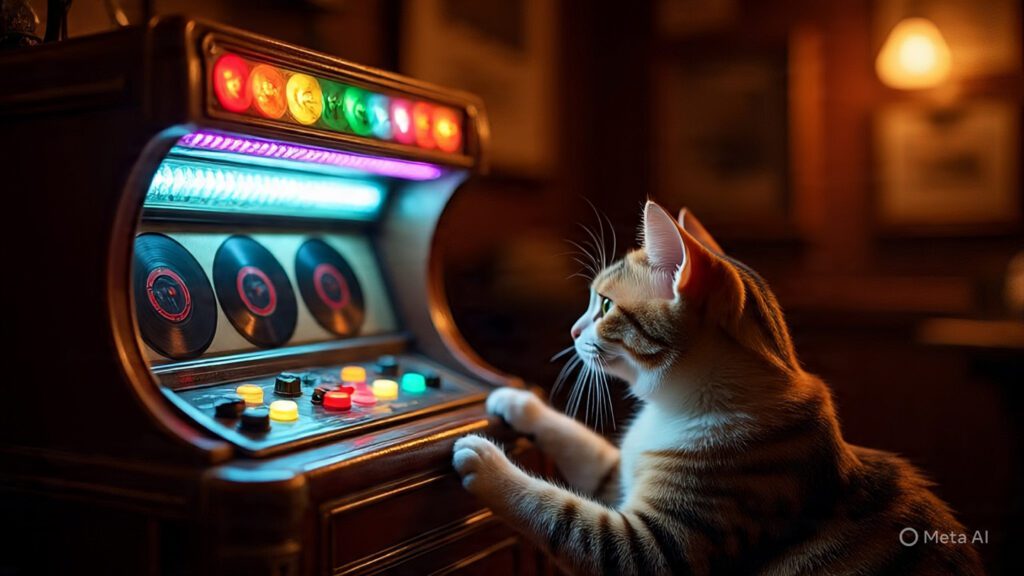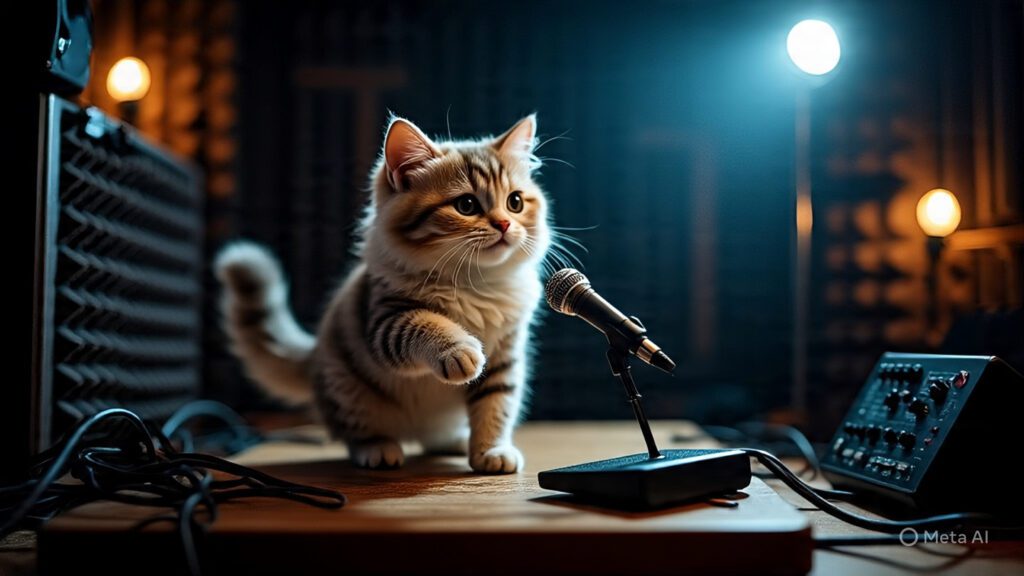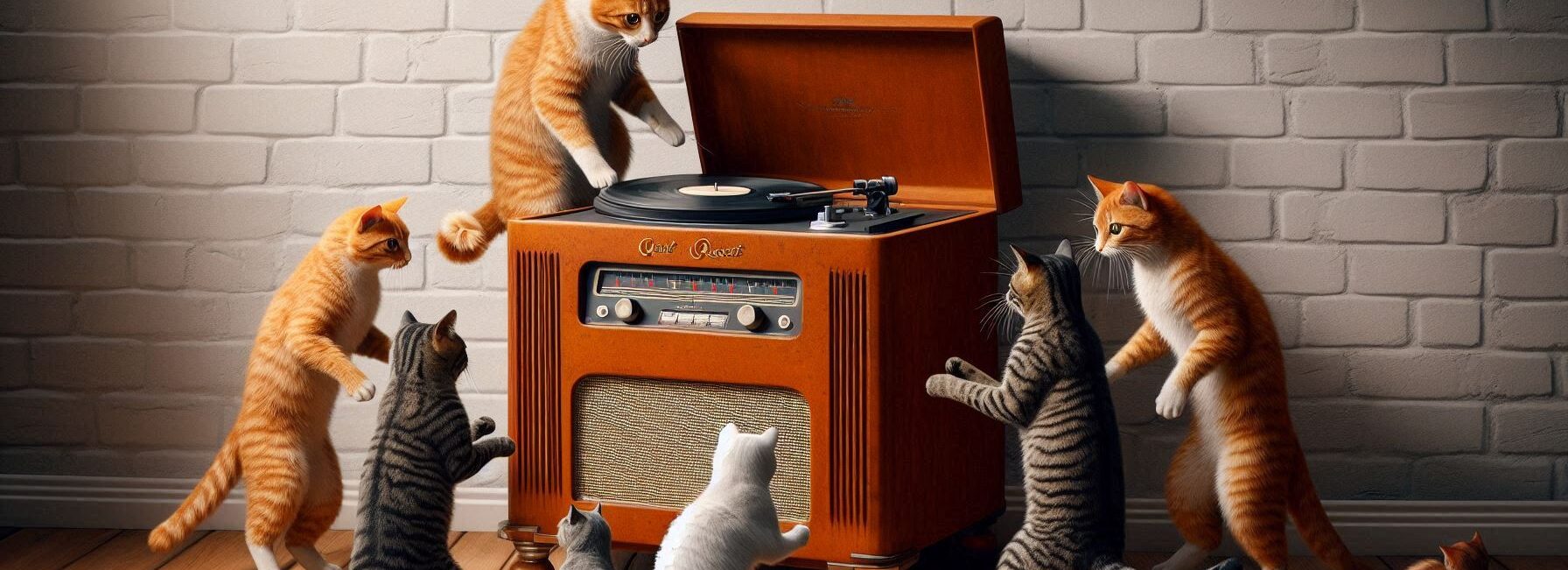I think about the major questions in life a lot because I love my cat. Questions such, “Why does my cat look at me like I'm an alien?” or “Do cats really like music?”
It looks like our cats could have more refined preferences than we thought. So, let's get into the musical world of cat music and discover what it does to our furry friends.
Top Takeaways and Key Concepts
- Cats hear higher frequencies than humans, so select music within their range.
- Classical or soft instrumental music helps cats relax and reduce stress.
- Play cat-specific music to encourage purring, calm behavior, and engagement.
- Vary playlists regularly to provide mental stimulation and prevent boredom.
- Singing or playing music with your cat strengthens bonding and emotional connection.
Article Summary
Cats have highly sensitive hearing and respond differently to various types of music. Classical or soft instrumental music can reduce stress and promote calm behavior, while cat-specific compositions cater to their unique hearing ranges and encourage relaxation. Regularly changing playlists provides mental stimulation and keeps cats engaged. Additionally, sharing music or singing with your cat strengthens the emotional bond between owner and pet, enhancing both the cat’s well-being and the owner’s enjoyment. Creating a thoughtful musical environment can improve your cat’s daily life and deepen your relationship.
Video Summary
Please Note: This post may contain affiliate links. If you click one of them, we may receive a commission at no extra cost to you. As an Amazon Associate, I earn from qualifying purchases.
Jump to Content
The Science of Sound and Cats

Let's start with some interesting science, by the way! Cats can hear considerably better than we can. They can hear noises up to 64 kHz, which is much higher than the 20 kHz that humans can hear.
This means that your cat could be able to hear notes and tones that you can't when you play your favorite songs. Isn't that crazy?
Researchers have found that different forms of music can make cats act in different ways, which is interesting.
For instance, classical music has been demonstrated to relax cats, just like it does for people. The soft melodies and beautiful compositions can make a peaceful space that helps our cats relax and feel less stressed. On the other side, loud rock or pop songs with powerful beats and a lot of energy could make them run under the couch faster than you can say “catnip.” You have to wonder: do they like Beethoven more than Beyoncé? We might prefer to sing along to our favorite songs, but our kitties probably like something more relaxing.
Also, recent research shows that music made only for cats, with their unique hearing range in mind, might make them act better, like purring and relaxing. This kind of music frequently has certain frequencies and patterns that cats can hear well, making it a pleasant and calming experience for them.
Picture a concert hall full of cats gently moving to calming music! Imagine fluffy cats lying on soft pillows while soothing piano music plays in the background. It's a scenario that's almost too cute to handle. These pieces of music not only make your cat happy, but they also help to improve their surroundings.
Adding this type of music to your cat's daily routine could make their life a lot better. For example, playing relaxing music during stressful events like thunderstorms or fireworks can make people feel less scared. Also, playing some peaceful music in the background as you eat or play could help your cat feel more relaxed and involved.
We should think about how acoustics affect our pets' mental health as much as we do their physical health. Making a space with calming noises could make your cats happier and healthier, and they might be less likely to act anxious.
So the next time you and your pet are relaxing at home, why not try out some various types of music? You might find that your cat likes some kinds of music more than others, or even that they like certain composers more than others! After all, making your cat feel safe and happy is the most important thing you can do to make them happy.
Handy Amazon Shopping Directory for Cat Supplies
Cat Food - Cat Toys - Cat Health - Grooming - Carriers - Cat Beds - Apparel
Furniture - Cat Doors - Collars - Feeding/Watering - Flea/Tick Control - Treats
What Do Cats Like?

Let's see how cats react to different kinds of music. A lot of cats seem to like it when you treat them gently and don't yell at them.
Picture a normal cat snuggled up in a sunbeam listening to a wonderful piano sonata instead of a heavy metal guitarist screaming solos at the top of their lungs (which I know isn't true for all cats).
Each cat is different, much like people, and each cat has its own personality. Some people might like soothing harp music, while others might want low-frequency background noise that sounds a little like nature.
Have you ever seen how your cat's ears perk up when they hear birds chirping outside? It's a beautiful picture, and it shows how well cats can sense their surroundings. Their excellent hearing lets them hear even the quietest chirp of a bird or the tiniest rustle of leaves, which makes them great hunters. This natural capacity shows not only their predatory impulses but also why some noises may entirely hold their attention.
It's interesting that music may have different impacts on cats, especially when they're stressed out, like when there's a rainstorm or when they go to the vet. You might find it a little funny that music, which is so calming, could help our furry friends relax in such busy places. If your cat is in its carrier and it's thundering outside, a soft tune might help calm it down. I wish my cat could listen to some smooth jazz while he takes a bath. That's a nice notion. A calm setting with soft music could make an encounter you fear more delightful.
Studies have proven that some kinds of music can actually make a cat feel better and act better. For example, classical music with calm melodies and delicate rhythms might assist our pets rest and feel comfortable when they're stressed out. What a pleasant picture! Just picture your cat lounging happily in its favorite spot while calm symphonies play.
Also, trying out different types of music could help you find out what your cat likes best. Some cats could like relaxing instrumental music, while others might prefer more upbeat songs made just for cats. The best part of this exploration is watching how your cat reacts. Do they settle down happily? Do they knead their paws or purr? These small signs might help you make the perfect sound environment that will improve their health and happiness.
So the next time you're relaxing at home or getting ready for a trip to the vet, think about adding music to the mix. You can play classical symphonies or songs made only for cats. Either way, you'll be giving them an experience that meets their specific sensory needs. Creating a peaceful environment is good for our dogs and for the attachment we have with them. One calming note at a time!
Making a Musical Space

We know that cats listen to and like music, so how can we make it the best experience for them? First, keep the noise low so no one has to leap through a window.
Next comes the fun part: picking a sound for your pet. Most cats like classical music or soft instrumental music.
You may even find playlists made just for cats! Who would have thought that services like Spotify would go to such great lengths to please our cats? Imagine throwing a great small party with Mozart music that calms your cat down and makes them the center of attention. It would be a symphonic experience exclusively for them. It's a funny idea that your living room may become a pleasant concert venue with soothing music that only your pet can really enjoy.
But you should remember that your cat's musical exposure shouldn't be limited to just one thing. Just like we can get tired of hearing the same music over and over again—thank heavens we don't have to listen to “Baby Shark” all day—our pets can similarly get used to songs they hear a lot. Cats love variety and stimulation, and they like new sounds just as much as humans do.
If you want to keep your aural environment interesting and new, try changing up your playlists often. If your cat doesn't appear as interested in their typical favorites or music in general, it might be time to play some new songs or genres. Try out different types, such soft piano pieces and quiet acoustic guitar strumming, and watch how your cat reacts. You may even try out ambient soundscapes or nature-inspired playlists that include soft rain noises or leaves rustling.
Adding these new things not only keeps your pet interested, but it also improves their health by giving them different sounds to listen to. Cats are inherently curious, so playing different kinds of music for them can get them interested and make them want to play. It's also a great way to get to know each other better; you can see how they react as you play new songs together!
So go ahead and make a playlist that changes over time! With each new item, you'll be making an environment that your cat will love and that will keep them busy and entertained. After all, keeping our dogs happy and healthy means giving them a fun place to live, one fun note at a time!
Music That Makes You Feel

This usage of music strengthens and brings together the link between the pet and the owner. The owner may image or imagine himself reclining on the couch with a soft pet next to him, watching TV a few hours after work. The room would be filled with calming music, and this would be the best way to relax!
Cats are quite good at reading emotions, which lets them pick up on our feelings and moods with astonishing precision. They can know when we're happy, upset, or even anxious since they have this kind of intelligence. Singing or playing soft music around them makes the space feel calm and friendly, which strengthens the link between ourselves and our cats. The soft songs create a calming background that helps both people relax, turning everyday times into special memories.
Picture yourself on the couch with your cat next to you, softly humming a song you like. The music and your voice together create a warm and peaceful space that everyone may enjoy. These small acts of musical exchange not only make your cat's life better, but they also make your own life better. This kind of interaction creates a bond that goes beyond words. It's a lovely reminder of the special bond we have with our pets.
Also, these times when you and your cat are surrounded by sound can lead to happy cuddling sessions where you both feel safe and happy. Who wouldn't like to spend those tranquil days together, surrounded by soothing music? You're not simply keeping them busy when you rub their fur and sing along to your favorite songs; you're also building trust and love via shared experiences.
Studies have also shown that music can make animals behave better, which lowers their stress levels and makes them more relaxed. Adding music to your time together, whether it's classical pieces or soft acoustic noises, makes the space more interesting and makes both you and your furry friend happier.
When you want to connect with your cat, try playing some calming music or singing gently together. These times when you and your pet listen to music together are more than simply fun; they are also chances to enhance the bond between you and your pet. After all, who wouldn't want to miss out on those special times when they cuddle up with their favorite cat and feel happy, loved, and at peace? Music is a powerful way to connect with others, so embrace its enchantment and enjoy the ride!
Suggested External Resources:
Music Therapy for Cats
https://www.musictherapy.org/music-therapy-for-cats/
How Music Affects Pets
https://www.petmd.com/news/health/how-music-affects-pets-40077
The Benefits of Music for Cats
https://www.cattime.com/cat-facts/36429-benefits-of-music-for-cats
Frequently Asked Questions
Can cats actually hear more musical frequencies than humans?
Yes, cats hear much higher frequencies than humans, which means they can detect tones we cannot hear in many songs.
Does classical music help cats relax?
Classical or soft instrumental music has been shown to help reduce stress in cats and support calmer behavior.
Is music made specifically for cats beneficial?
Yes, cat-specific compositions are designed within their hearing range and can encourage purring, relaxation, and positive engagement.
Should I avoid loud or fast music around my cat?
It is best to avoid loud or intense music because it may startle cats or cause them to hide due to stress or discomfort.
Can rotating music playlists help mental stimulation?
Yes, varying songs and playlists prevents boredom and provides ongoing mental enrichment for your cat.
Does singing to my cat help bonding?
Gentle music or soft singing can strengthen emotional connection because cats respond to calm auditory cues from trusted humans.
Can music help during stressful events like thunderstorms?
Soothing music can create a calming environment and help reduce anxiety during storms, travel, or other stressful moments.

Kevin Collier is a dedicated feline enthusiast and expert contributor at CatFAQ.com, where he shares his knowledge on cat health, training, and overall well-being. With years of experience caring for and studying cats, Kevin provides insightful tips and practical advice to help cat owners nurture and understand their pets better. His passion for enhancing the human-animal bond shines through in his articles, making them a valuable resource for anyone looking to improve their cat’s quality of life. Whether it’s training techniques or health care tips, Kevin aims to empower cat owners with the information they need to ensure their furry companions thrive.


